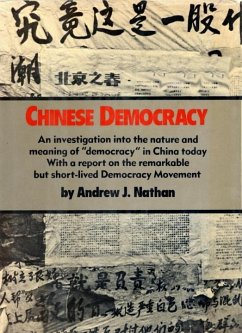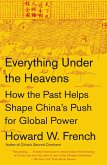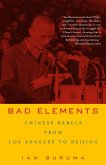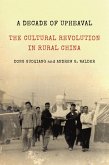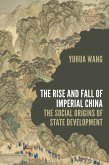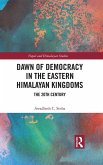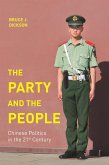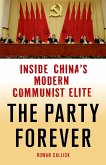What do the Chinese mean by the word "democracy"? When they say that their political system is "democratic," does this mean that they share our ideas about liberty, civil rights, and self government? With the recent improvement in relations between China and the West, such questions are no longer merely academic. They are basic to an understanding of the Chinese people and their state, both now and in the future. In Chinese Democracy, Andrew J. Nathan tackles these in issues in depth, drawing upon much fresh and unfamiliar material. He begins with a vivid history of the short-lived democracy movement of 1978-81, where groups of young people in a number of Chinese cities started issuing outspoken publications and putting up posters detailing their complaints and opinions. Apparently condoned at first by the post-Mao regime, the movement flourished; then it was crushed, its leaders tried and jailed. With quotes from many of the participants and their works, Nathan constructs-for the first time-a poignant picture of the burst of liberal activity, at the same time showing how distinctly Chinese it was and how the roots of its failure lay as much in history as in current political necessity. To demonstrate this, Nathan investigates the nature of the democratic tradition in China, tracing it back to the close of the imperial era at the end of the nineteenth century and the works of Liang Qichao, the country's most brilliant journalist and most influential modern political thinker. We see how Liang deeply influenced Mao Zedong, and how conflicts between party dictatorship and popular participation, between bureaucratic authority and individual rights, between Mao's harsh version of democracy and Deng Xiaoping's more liberal one, remain to this day unresolved and potentially dangerous. For example, as Nathan shows, there was apparently a serious move toward liberalization projected on the highest government levels in the years after Mao's death, yet the move failed. In a tour de force of scholarship, Nathan shows through an extended study of the many Chinese constitutions put force since the 1911 Revolution that individual rights have always been forced to give away to the needs and ambitions of the state. Democracy in China has traditionally been admired mainly for what it can help accomplish, not for any human rights it may embody. Finally, making use of scores of interviews with émigrés from the mainland, the author analyzes the extraordinary role played by the press in forming public attitudes in China, and then goes on to show what happened in 1980 when the authorities for the first time conducted direct elections to the county-level people's congresses. It was a splendid shambles. Much of this story has never been told before. Chinese Democracy is a highly original and convincing book on a subject of immediate concern, a rich combination of reportage and research by one of our best-informed China specialists. No one can read it without gaining an entirely new perspective on the nature of democracy as the Chinese practice it-and, incidentally, as we practice it too.
Dieser Download kann aus rechtlichen Gründen nur mit Rechnungsadresse in A, B, BG, CY, CZ, D, DK, EW, E, FIN, F, GR, HR, H, IRL, I, LT, L, LR, M, NL, PL, P, R, S, SLO, SK ausgeliefert werden.

